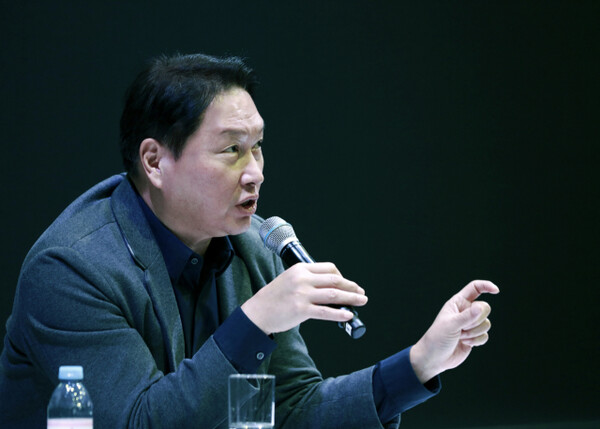
On the afternoon of Jan. 6, a day before the opening of the world’s largest consumer electronics and information technology (IT) exhibition, CES 2025, Jensen Huang, CEO of NVIDIA, delivered a keynote speech at the Michelob Ultra Arena in the Mandalay Bay Convention Center in Las Vegas, Nevada, USA. This event set the stage for significant developments in the tech industry, particularly involving SK Group and its subsidiaries.
Chey Tae-won, chairman of SK Group, solidified the AI semiconductor alliance with NVIDIA at CES 2025. Chey met with Huang for the first time in nine months, drawing praise for the rapid development of high-bandwidth memory (HBM) and agreeing to continue cooperation in “physical AI,” considered the final destination in the AI supremacy battle. Chey also hinted at supplying SKC glass substrates to NVIDIA, indicating an expanding scope of cooperation.
During a press conference with domestic reporters at the SK exhibition hall at CES 2025 in Las Vegas on Jan. 8, Chey stated, “I met with Huang today.” This was their first face-to-face meeting since April last year. Chey elaborated, “Previously, SK Hynix’s development speed was slightly behind NVIDIA’s increasing demands, so the other party (NVIDIA) requested faster HBM development. Recently, SK Hynix’s development speed has surpassed these demands.” He added, “The head-on strategy means both parties are accelerating their development speeds, which is what was discussed regarding HBM.” Chey expressed confidence in SK Hynix’s HBM development competitiveness, and Huang acknowledged this technological prowess.
Chey and Huang also agreed to closely cooperate on Physical AI, a major topic at this CES. Chey remarked, “This CES confirms that robots and AI integration into our daily lives, known as Physical AI, has become common and normalized,” adding, “We exchanged opinions on Physical AI with Huang and discussed trying it together in the future, although nothing specific has been decided yet.”
The market’s attention during this meeting was on SKC’s glass substrates. Chey, while touring the SK Group booth, lifted a model of SKC’s glass substrate and said with a smile, “I just sold it.” This implies that he confirmed the supply of glass substrates to a customer. The market and industry speculate that SKC’s glass substrates may be supplied to NVIDIA, as Chey visited the SK Group booth around 11 a.m. after meeting with Huang. It is highly likely that Chey visited the CES exhibition hall immediately after meeting with Huang.
Glass substrates are considered a “game changer” in the semiconductor industry. They have smoother surfaces than traditional plastic substrates, allowing for more ultra-fine line-width circuits to be drawn using lithography equipment, resulting in a 40% increase in semiconductor speed while reducing power consumption by half. Additionally, they eliminate the need for an intermediate silicon substrate, reducing the package thickness by more than half.
SKC is striving to dominate the market with its glass substrate business investment company, Absolix. It has completed the world’s first mass production plant in Georgia, USA. Last year, it secured $75 million in production subsidies and $100 million in research and development (R&D) subsidies from the US government, recognizing its technological innovation. Absolix is currently in mass production discussions with multiple customers.
Chey reiterated the importance of securing AI supremacy. Chey emphasized, “AI is a matter of survival, not choice,” pointing out that “falling behind in competition will weaken the competitiveness of all industries that our country prides itself on, whether it’s semiconductors or shipbuilding.” He stressed that Korea, tasked with achieving technological independence in the AI supremacy battle, should actively foster the AI industry by leveraging its national characteristics of strong manufacturing capabilities.
Chey emphasized the importance of securing a technological gap to survive the wave of changes brought about by the evolution of AI technology. After touring the SK and Samsung Electronics booths, Chey said, “Whether we lead the change or follow will determine the form of ups and downs,” regarding AI technology. In his closing speech at the ‘CEO Seminar’ in December last year, Chey predicted that “the AI market expansion due to the emergence of next-generation ChatGPT is likely to occur around 2027.”
Chey suggested that Korea should fully utilize its national characteristics of overwhelming strengths in manufacturing to secure global top-tier AI technology competitiveness. Chey said, “If we pursue AI business without specialization, no company or startup will win in global competition,” emphasizing the need for strategic support in areas such as manufacturing-related AI or robot-related AI.
Chey also reiterated the importance of AI technology sovereignty. He explained, “We must develop application programming interfaces (APIs) ourselves in some form,” adding, “If we rely on other countries for AI infrastructure, it will be very difficult to pioneer our future independently.”
Chey emphasized the importance of AI infrastructure and human resource development to secure AI technology sovereignty. Chey said, “What Korea needs most is AI infrastructure and people,” adding, “We need to create a basic environment where people can use AI regularly through education, and where those who create and research AI can experiment with AI and produce results.”



